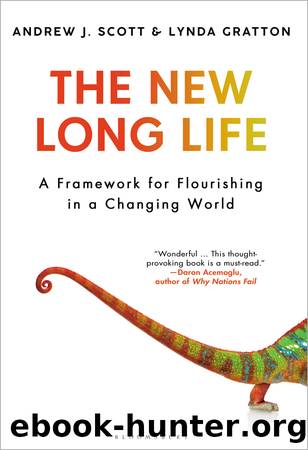The New Long Life by Andrew J. Scott

Author:Andrew J. Scott
Language: eng
Format: epub
Publisher: Bloomsbury Publishing
At the dawn of the French Revolution, the English poet William Wordsworth wrote: âBliss was it in that dawn to be alive./ But to be young was very heaven.â22 At the dawn of a revolution spurred by AI and longer lives, the same cannot be easily said by todayâs young.
For their parents or grandparents, certainly in the developed world, a three-stage life was sufficient to support a family, a house and a pension. For the young this is an unlikely prospect. They will not experience a lifelong career in the same role or even the same sector and need now to plan for a sixty-year career. And whilst for their parentsâ generation a university qualification offered a failsafe for a career and a good salary, this is unlikely to be their experience. In many countries the young are finding it harder to get jobs and to get on the initial rung of the career ladder; they can anticipate more career disruption, and cannot rely on their initial education to propel them through their entire career. For older generations the three-stage life could provide a steady career and financial stability; for the young the future appears just one long hustle.
There is also the vexing question of rising house prices. In major cities these are working against the young and leading to sharp falls in the rate of home ownership. In the UK the decline is dramatic: thirty-year-olds are now only half as likely to own a house compared to those currently in their sixties and seventies.23 The same is true in Australia and the US. As a consequence, the young are a generation who will reach their forties with significantly less wealth than past generations.
To compound matters, society is standing behind the health and pension commitments made to earlier generations. A three-stage life was essentially designed for a life expectancy of seventy years; it is now being stretched to eighty-five years and being financed in part by the working young, who will receive few if any of the same future benefits. In 1936 when Franklin D. Roosevelt accepted the Democratic nomination for president he remarked: âTo some generations much is given. Of others much is expected.â That has an ominous sound to the young in many countries. In Japan a new word â rougai â is used to refer to the harm or inconveniences, big or small, that are inflicted on the young by a growing elderly population.24
These multiple pressures are leading to a belief in some countries that the young will be worse off in the future than their parents were.25 In Japan, 38 per cent of people believe their children will be worse off (compared to 28 per cent who think they will be better off); in France it is 71 per cent (compared with only 10 per cent who expect an improvement). This isnât a global phenomenon, and parents in fast-growing economies, such as India or China, are more positive. In these countries, economic growth of between 5â7 per cent per annum is leading to income doubling every 10â14 years.
Download
This site does not store any files on its server. We only index and link to content provided by other sites. Please contact the content providers to delete copyright contents if any and email us, we'll remove relevant links or contents immediately.
The Concise Laws of Human Nature by Robert Greene(1893)
Bioenergetica by Alexander Lowen(1472)
After by Bruce Greyson(1402)
The Child in You by Stefanie Stahl(1250)
No Bad Parts by Richard C. Schwartz(1235)
Stress-Proof Your Brain The Yogic Way: Unique Ancient Indian Techniques to End Toxic Stress, Stop Worrying and Inculcate Mental Toughness by Advait(1122)
Talk of the Ton by unknow(1051)
The Power of Myth by Joseph Campbell & Bill Moyers(1049)
Badass Habits: Cultivate the Awareness, Boundaries, and Daily Upgrades You Need to Make Them Stick by Jen Sincero(1034)
Chakras & Self-Care by Ambi Kavanagh(959)
Living a Life of Awareness by Don Miguel Ruiz Jr(921)
Self-Care for Empaths by Tanya Carroll Richardson(907)
Learn To Think Using Thought Experiments by King Patrick(903)
The Mind by E. Bruce Goldstein(898)
The 7 Secrets of Sound Healing Revised Edition by Jonathan Goldman(884)
Curative Magic by Rachel Patterson(875)
The Quantum Psychiatrist: From Zero to Zen Using Evidence-Based Solutions Beyond Medication and Therapy by Biswas Dona(872)
The Tao of Intimacy and Ecstasy by Solala Towler(862)
The Anxiety First Aid Kit by Rick Hanson(846)
